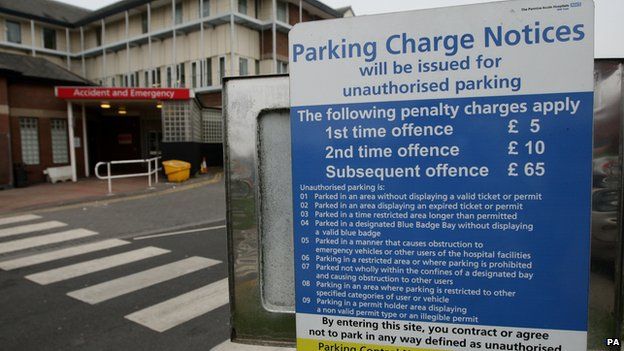Hospital car parking guidance to reduce some charges
- Published
- comments

Hospitals in England have been told to cut the cost of parking for certain groups under new government guidelines.
Ministers said relatives of people who were seriously ill or had to stay in hospital for a long time should be given free parking or reduced charges.
Concessions should also be offered to people with disabilities and NHS staff whose shift patterns meant they could not use public transport, they said.
Labour accused the coalition of dropping plans to scrap the charges.
Hospital parking policies are set by individual NHS trusts.
The Department of Health guidance made it clear trusts were responsible for the actions of private car parking contractors running facilities on their behalf.
'Rip-off' costs
The guidelines also recommended hospitals should use "pay-on-exit" schemes so motorists pay only for the time they use in a hospital car park.
And they say trusts should waive fines if a visitor or patient overstays through no fault of their own, for example because treatment took longer than planned, or when staff have to work beyond their scheduled shift.
Health Secretary Jeremy Hunt said: "Patients and families shouldn't have to deal with the added stress of unfair parking charges.
"These clear ground rules set out our expectations, and will help the public hold the NHS to account for unfair charges or practices."
Mr Hunt had come under pressure from Conservative backbenchers to put an end to "rip-off" costs.
As part of that campaign, Harlow MP Robert Halfon sent Freedom of Information requests to almost 400 hospitals in England. The data he collected shows big differences in average costs across the country.
London had the highest charges, with an average of £20 a day and more than £130 a week.
The lowest charges were in the East Midlands, where parking costs were £3.50 per day and £11 per week.
Mr Halfon described the announcement as a "massive step forward" but said he wanted to see charges scrapped altogether, at a cost of £200m.
"Hospital parking has become a stealth tax on the vulnerable," he told BBC Radio 4's Today programme.
"The stories that we've had of people not being able to use the machines so they haven't been able to see their dying relatives is quite horrific and we have to make a change."
'Extortionate'
Ben Ruth, who received two parking tickets as he visited his dying father in the Royal Lancaster Infirmary, said the experience left him feeling "sickened".
He had left his car in a parking bay on the road immediately outside the hospital, which offers free parking for up to two hours.
As he was with his father, he went over the allocated time and, he said, it was "not an option" for him to leave to move the car.
"The second [ticket] was stuck on the windscreen when I left the hospital ward just after my father passed away," he said.
"I've rarely felt such rage as I felt right then. After the exceptional kindness of the medical staff in my father's ward, I felt grievously assaulted."
In total he was fined £50 which he was able to get back after an appeal.
Macmillan Cancer Support said some patients were paying "extortionate" charges "in order to access treatment for a life-threatening illness".
Welcoming Mr Hunt's announcement, Duleep Allirajah - head of policy at the charity - urged hospitals not to ignore the guidance.
"Hospitals must... commit to implementing the guidelines as a matter of urgency so that cancer patients do not continue to pay unfair hospital parking charges," he said.
Analysis: Roger Harrabin, BBC News
Some hospital parking stories sound outrageous, and charges are indeed a burden on some drivers. But the issue is complex.
The poorest in society and the elderly are most likely to get sick, but the least likely to drive. They are often saddled with long expensive bus journeys to out-of-town hospitals easily accessed by motorists.
Should the NHS provide minicabs for patients or visiting relatives without cars?
Campaigners complain about the cost of NHS staff parking, but many hospitals are on expensive prime land. Car parks take up space that could be used for wards, and free parking would effectively subsidise drivers.
What's more, hospitals like other major employers, are under pressure from councils to reduce driving to cut congestion and pollution.
And how would hospitals replace the lost income from parking charges? It's not simple.
Parking has been free for patients, visitors and staff in Scotland since 2009 but charges remain at three car parks built under private finance initiatives in Edinburgh, Glasgow and Dundee.
All but four hospitals in Wales have stopped charging for parking. Those that require payment have been told to abolish charges once their contracts with private parking firms expire.
Patients with certain chronic conditions in Northern Ireland do not have to pay to park.
Ahead of the 2010 general election, the then Labour government promised to scrap car parking charges - a move described as "unworkable" by the coalition when it came to power.
"Jeremy Hunt needs to take responsibility for the fact that since then, one in four hospitals has increased parking fees," shadow health minister Andrew Gwynne said.
"Any action to ease the burden of car parking charges on patients and their visitors is welcome. When people go to hospital, the last thing they want to worry about is parking fees."
- Published22 August 2014
- Published14 August 2014
- Published8 July 2014
- Published9 June 2010
- Published16 September 2010
- Published7 December 2012
- Published24 April 2014